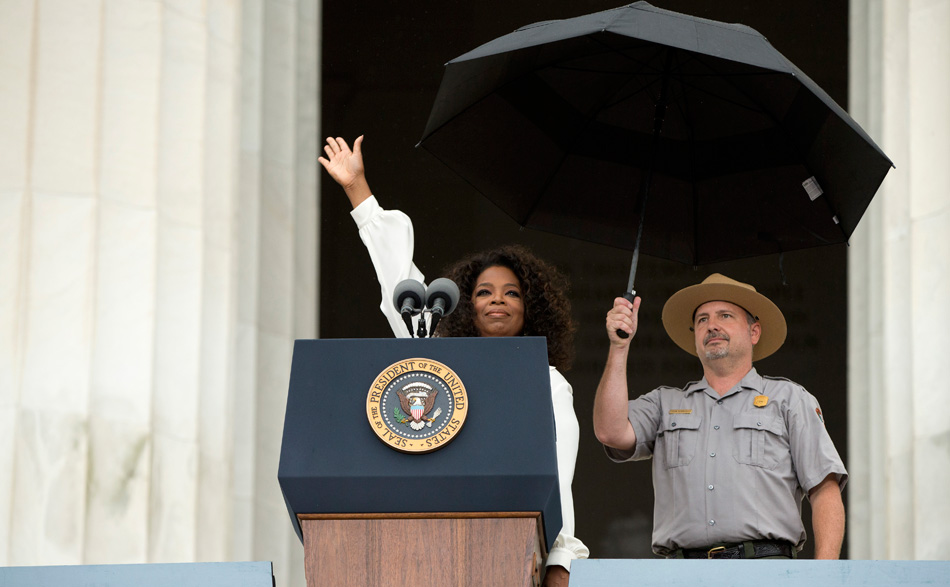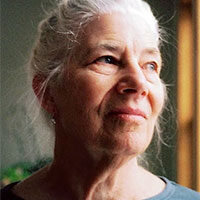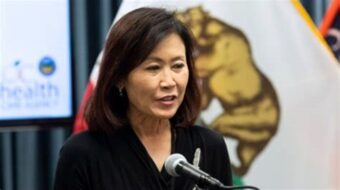
I’m angry and frustrated that the tidal wave of support for the possibility of an Oprah Winfrey presidential candidacy crashed up against a cliff of double standards and faux radicalism this week.
So, I take issue with a piece in this week’s People’s World by commentator Patrick Foote that issues a dire warning that Winfrey’s possible nomination would be an “eschaton” (a fancy word for the end of the world). The damning charge against Winfrey? “The means by which Oprah has skyrocketed to wealth and fame,” we are informed, “are contradictory to the collective solidarity” that was on display at Sunday’s Golden Globes ceremony.
The Golden Globes award speech by Winfrey was the earthquake that launched that tidal wave. In the spotlight of the #MeToo movement, Winfrey recalled the forgotten story of Recy Taylor. At the height of the Jim Crow era in 1944, six armed white men in Henry County, Alabama kidnapped and gang-raped Taylor, a 24-year-old African-American woman.
Against all odds, and in the face of death threats to herself and her family, Taylor refused to accept shame and humiliation. She refused to be silent. The Daily Worker, which was the predecessor of this publication, through its African-American reporter Eugene Gordon, launched a campaign for justice for Taylor.
Who could have predicted back then that the bravery of Recy Taylor would be the centerpiece in a speech—by another black woman of another generation—that would spark a campaign, a hunger, for a presidential bid? Shouldn’t that fact in and of itself be celebrated and lifted up across the board by those who look for relief from the horrors of the Trump presidency?
Or, to put it another way: Guys, could we women please have just a moment to celebrate before you rush in with the buckets of cold water to douse the embers of our pride and solidarity?
Of course, there are problems with having government in the hands of billionaires and celebrities (and we should add generals to that list), but that didn’t start with Oprah Winfrey or even Donald Trump. What about Ronald Reagan? Dwight Eisenhower? Or even Franklin Roosevelt? Why is it suddenly a problem when it’s Oprah Winfrey who has the nerve to speak for us?
How dare she?
When women step out and do things out of the ordinary—speaking up, asserting our leadership—we are often met with an unspoken attitude of “how dare she?” If we don’t follow the “accepted” path to leadership (that is rarely open to women, especially black and other working class women) we are subjected to the harshest of critiques.
Winfrey recognizes and builds on the #MeToo campaign, the largest collective effort of women to change their workplace environment ever seen in our country’s history. That’s a pretty big platform. Can we dismiss her understanding of collective solidarity?
Winfrey is accused of being an apologist for neoliberalism who hides “the role of political, economic, and social structures instead of examining the economic or political base of these feelings.” Foote goes on to repeat author Nicole Aschoff’s charge that Winfrey “advises us to turn our gaze inward and reconfigure ourselves to become more adaptable to the vagaries and stresses of the neoliberal moment.”
Actually, the term “neoliberalism” has a specific meaning—referring to policies of privatization, de-regulation, pro-corporate globalization, union-busting. and control by finance capital. Is that what Oprah’s shows were about all these years? I see it differently. To me, her shows were about starting a conversation on topics others didn’t dare to touch. She pushed the envelope and brought up issues that many were experiencing in silence. Her approach was intensely humanistic, and while I never saw her take an explicitly anti-capitalist approach, humanism is intrinsically anti-capitalist.
Just look at her early programs, where she openly spoke about racism, or to one of her last, where she had 200 men who had all suffered sexual abuse as children speak about their experience. It opened a national conversation. Now that is certainly not the same as “avoiding the search” for neoliberalism’s deeper roots. A better example of an apologist for neo-liberalism would be Fox News.
The article, in effect, charges Winfrey with profiting from the stories she tells of the American people. It makes a point of paralleling her with Donald Trump, saying that they are the only two folks who would profit from a head-to-head campaign, along with the advertising and media apparatus, of course. To ignore the adversity Winfrey faced as a black child growing up in poverty and to lump her in with other rich people like Trump is dismissive of the black experience in the U.S. and the white supremacy embedded in our country’s economic and social systems.
Fortunately, Winfrey’s brilliance is not overlooked by the American public. She has an ability to speak to the American working class—including the white workers who have been so challenging for many in the progressive and labor movements to reach. It is precisely Winfrey’s compelling telling of their story that reaches these folks.
Can we casually write off the cultural shift in this country that Winfrey led? Can we understand the political implications of millions of white women seeing her as their role model and guide? Is it possible that there might not have even been an Obama presidency without Winfrey’s appeal to white women? Could she really have something to teach us? How dare she!
Viewing struggle through a moral lens
We are in an era when black leadership is coming to the fore of the people’s movement. Coming after the two successive elections of Barack Obama, the excitement among the American public about the prospect of a Winfrey candidacy could indicate one more step forward in a little noted political development: today, wide numbers of white people are listening to and following black leaders.
Winfrey, like Rev. William Barber, the leader of the Forward Together Moral Movement and initiator of the new Poor People’s Campaign, views the struggles of the American people through a moral lens, not a right-left paradigm. Could we learn something from these African-American leaders? Given the role that racism has played historically in dividing and diverting our working class, this development is of huge significance.
I don’t know if Winfrey will run for president or not, but the fact that it is being talked about and supported is a plus.
I think back to the candidacy of Bernie Sanders, whom I enthusiastically supported. True, his life story didn’t check all my boxes. He wasn’t a union activist; he never worked the night shift at a steel mill; he was a life-long politician; he never personally faced the humiliation of sexual or racial discrimination; I doubt if he ever had someone paste pornography on his locker or hide his tools so he couldn’t work. Still, I was confident he could speak and lead on those issues. No one even asked. Sanders comfortably fit the template of the politician that is so well-skilled HE can navigate the complex political system, and his followers gave him the moral authority to do that.
So, I was disappointed that some who see themselves on the left felt such urgency to put the kibosh on an Oprah Winfrey candidacy. I was disappointed in the righteous indignation at the idea that Oprah Winfrey, with her own leadership style and success (even if she doesn’t fit the timeworn leadership template), is also deserving of that moral authority. Isn’t it worth thinking about what we would have to change in our culture and our own thinking to get comfortable with that idea?
Our main goal must be to prevent the eschaton of a Trump second term. If Oprah Winfrey is the vehicle for that, let’s urge her to dare!












Comments